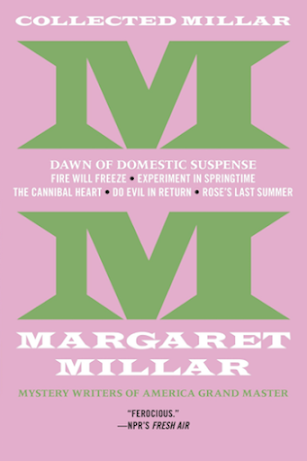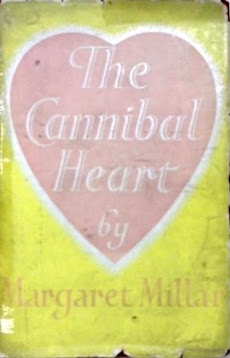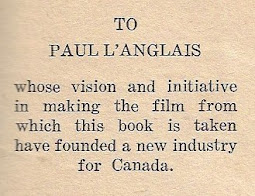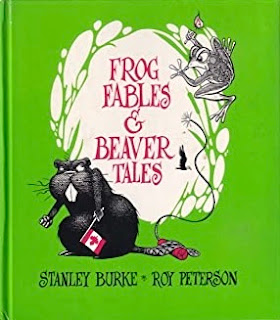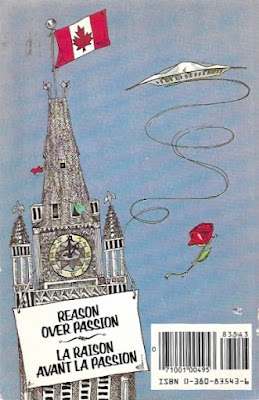Son of a Meech: The Best Brian Mulroney Jokes
Mark Breslin, ed.
Toronto: Ballantine, 1991
113 pages
News of Brian Mulroney's death last Thursday did not hit hard. I was no admirer. As a young man, I dismissed Mulroney as Ronald Reagan Lite. Simplistic, but not wrong. In 1984, the year he led his party to the second greatest electoral victory in this country's history, I was distrustful and skeptical. It came as no surprise when his government began selling off Crown assets at Fire Sale prices.
The Mulroney government spanned the better part of my twenties. He hung onto power, forcing the game into overtime, only to leave the political arena when it became clear he could not score a third victory. Mulroney all but destroyed the Progressive Conservative Party, leaving Kim Campbell and Peter Mackay to ensure its end.
Nostalgia.
As I say, I was no admirer, though I've come to recognize the man's achievements. He somehow managed to convince Ronald Reagan and Margaret Thatcher that Apartheid was wrong, which was no small feat. He wasn't quite as successful in pushing Reagan on acid rain, but he did get a treaty through with the first President Bush. Mulroney really was our "greenest prime minister," a title included in most of the obituaries.
That he holds it still, three decades after he stepped down as PM, is a sad commentary on his successors.
 |
Son of a Meech
Andy Donato
Toronto: Key Porter, 1990
|
Son of a Meech is so obvious a pun that Breslin's book is the second to use it as a title. The Meech Lake Accord was Mulroney's greatest gambit, and his greatest defeat. I was against it at the time but have since changed my position. I won't go into my reasoning as it would add five thousand words to this post. I'd much rather focus on this collection of "
The Best Brian Mulroney Jokes" because it anticipates the hate, homophobia, and misogyny spread by Ezra Levant, Jeff Ballingall's Proud pages, and
the Conservative Party itself.
And so, a warning to the reader, I will be quoting from this book.
Let's begin with stand-up comedian Mark Breslin's brief introduction, in which he describes how Son of a Meech was born:
After each show, members of the audience would approach me with jokes about [Mulroney] – vicious, mean, brutal – my kind of jokes. They weren't, as my literary sensei Jack Kapiica observed, the usual anti-government barbs, but personal ad hominem attacks on the man's most private self. These jokes stepped over the line of good taste, and I got interested.
Are these amongst the jokes he collected?
Canadians no longer believe in the theory of trickle-down economics.
Mulroney's trickled down on them long enough.
Not that the prime minister is crooked...
But last week he swallowed a nail and it came out a corkscrew.
Perhaps not. They don't step over the line.
Variations of the trickle-down economics joke can be traced back to Reagan's first term. The corkscrew joke has iits origins in an insult General Sir Gerald Templer delivered to Lord Mountbatten.
The most interesting part of Breslin's introduction suggests that the jokes provided by his fans weren't quite so numerous as he claims:
The collection got bigger, so I turned to Martin Waxman for help. He researched volumes of comedy material of all eras for jokes about despots and cruel or incompetent leaders. Sad to say, they fit.
And so, we get these:
Did you hear the new Mulroney stamp has had to be recalled?
People kept spitting on the wrong side.
What's the difference between the prime minister and yogurt?
Yogurt has culture.
Why would Mulroney never be eaten by cannibals?
Because he's too hard to swallow.
What do you call an Irish Canadian with half a brain?
Mr. Prime Minister.
Take a tired old joke, insert a reference to Mulroney, and you're pretty much done, but not always. This one was made contemporary with a reference to yuppies:
What's the only mediocre product yuppies will buy?
Brian Mulroney.
This one proved too difficult to update:
What's the difference between Howdy Doody and Prime Minister Mulroney?
You can't see Mulroney's strings.
There are even a couple of blonde jokes:
How do you make Brian Mulroney laugh on Monday?
Tell him a joke on Friday.
Looking to bolster his stodgy image, the P.M. spent the night at a rock club. And not wanting to be perceived as a square, he even snorted Sweet and Low.
He thought it was Diet Coke.
Tame stuff, lame stuff, these can't be the "vicious, mean, brutal jokes" Breslin says he likes.
I've given an imprecise depiction of this book's content, choosing to not share jokes involving bestiality or golden showers. There's also a fair amount of racist and homophobic writing, the most extreme being a joke that combines the two and involves the PM receiving a black coffee enema. I won't be sharing it either, but because I feel there should be at least one example of Breslin's vicious, mean, brutal jokes, I present this:
What's the difference between Rock Hudson and Brian Mulroney?
Brian's aides have not killed him yet.
Of the dozens of jokes in which she figures, this is the most tame:
Over dessert at 24 Sussex, Mulroney whispered to Mila, "Drinking makes you absolutely gorgeous."
"I don't drink," Mila replied.
"Yes, but I do."
The others feature fellatio, anal sex, adultery, and descriptions of a variety of sexual positions. Plumbers feature in four of them. 'The Unity Issue,' eighth of the book's ten sections, focusses exclusively on Brian and Mila Mulroney's sex life.
Mark Breslin was appointed a Member of the Order of Canada in 2017.
Was Brian Mulroney Canada's worst prime minister as Breslin claims? Of course not. The most recent Maclean's ranking had him in eighth spot, just below Jean Chrétien, which seemed about right. But then I remembered that Mulroney accepted bribes and was a tax cheat. How about we place him in the very middle, just below eleventh place John Diefenbaker, but above Alexander Mackenzie.
Seems more than fair.
Is Breslin's Canada's worst joke book?
Beyond a doubt.
 |
Martin Brian Mulroney
20 March 1939, Baie Comeau, Quebec
29 February 2024, Palm Beech, Florida
RIP |
Object and Access: A slim mass market paperback, I found my copy two years ago in a Kemptville, Ontario thrift store. Price: $1.00.
Son of a Meech is held by seven Canadian libraries, the most surprising being the Legislative Library of British Columbia. St Francis-Xavier University, Brian Mulroney's alma mater, does not have a copy.
Related posts:













